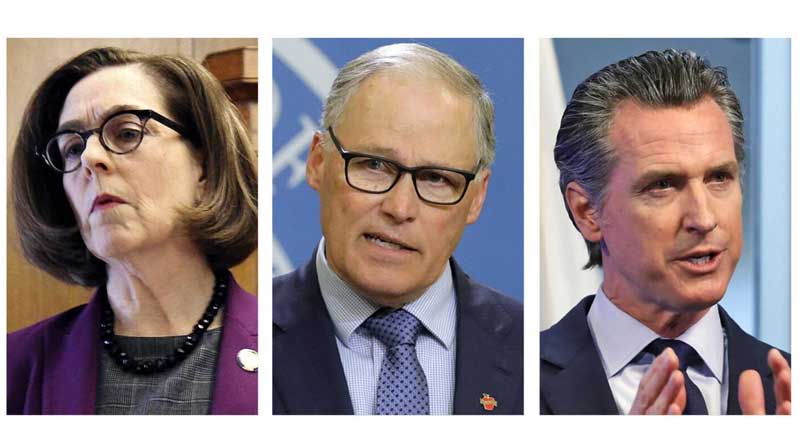Photo: AP / This combination of 2020 file photos shows, from left, Governors Kate Brown, D-Ore., Jay Inslee, D-Wash., and Gavin Newsom, D-Calif.
The Center Square [By Derek Draplin]-
Four governors of Western states that have joined together to review any COVID-19 vaccines approved by the federal government are facing criticism for “playing politics with the virus” from a conservative-leaning think tank.
Pfizer announced Monday that a study of its two-dose vaccine showed a 90% effectiveness rate, marking “a significant step” to “providing people around the world with a much-needed breakthrough to help bring an end to this global health crisis,” the corporation said.
Washington Gov. Jay Inslee, Oregon Gov. Kate Brown, Nevada Gov. Steve Sisolak, and California Gov. Gavin Newsom joined together last month to form the Scientific Safety Review Workgroup with the goal of reviewing “any vaccine that receives federal approval and verify its safety before California, Washington, Oregon and Nevada will make the vaccine available to the public.”
The workgroup, however, adds another barrier to accessing a COVID-19 vaccine, according to scholars from the Goldwater Institute, a Phoenix-based think tank.
“Unfortunately, some state governors are playing politics with the virus, building up unnecessary bureaucracy to keep Americans from accessing a vaccine. And that could pose serious risks not only to their constituents, but also to residents in neighboring states,” Goldwater Institute Director of Healthcare Policy Naomi Lopez and Vice President for Litigation Timothy Sandefur wrote on Monday.
“There’s nothing wrong with reviewing safety information and data regarding newly authorized or newly approved vaccines, but no politician – not the President nor any governor – should be playing doctor, especially at a time when every day of delay takes an enormous toll on human lives, economic opportunity, and mental well-being,” they continued.
The authors also argue that by restricting access to any vaccine that’s been FDA approved, at-risk individuals from the four states would likely cross state lines to a state where they could get access to the vaccine, leading to “increased risk of infection in those neighboring states, and increased risks to people in home states when travelers come home.”
Lopez and Sandefur additionally point out that the FDA issued guidance on a potential vaccine prior to the election, “which further insulated an [Emergency Use Authorization] decision from political interference,” so the governors shouldn’t be concerned that a vaccine could be approved for political reasons.
The Pfizer vaccine announced Monday requires two doses, and “protection is achieved 28 days after the initiation of the vaccination,” according to the corporation.



